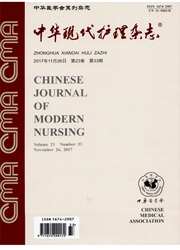

 中文摘要:
中文摘要:
目的:通过Meta综合分析明确心脏手术后谵妄的危险因素。方法制定原始文献的纳入标准、排除标准及检索策略,检索多个中英文文摘数据库和全文数据库。对检索的文献进行质量评价后,应用RevMan4.3分析软件分析,采用固定效应或随机效应模型计算合并后的综合效应。结果15篇文献符合纳入及排除标准。经Meta分析,年龄;房颤史、2型糖尿病史、脑血管病史、术前血肌酐水平异常、贫血及抑郁;实施瓣膜手术或同时实施冠状动脉旁路移植术及瓣膜联合手术、手术时间延长;术后机械通气时间延长、镇静剂及术后房颤具有综合效应,为心脏手术后谵妄的独立预测因子。结论房颤史及术后房颤、瓣膜手术或同时实施CABG手术及瓣膜手术及手术时间延长是心脏手术后谵妄独特的危险因素,而炎症反应与医源性环境因素与术后谵妄的关系,证据尚不充分。
 英文摘要:
英文摘要:
Objective To identify the risk factors of postoperative delirium after cardiac surgery . Methods Setting the inclusion and exclusion criteria and establishing the retrieval strategies for primitive literatures, several databases were searched .The RevMan 4.3 software was adopted to perform the analysis of sensitivity and heterogeneity and to calculate the cumulative effects of risk factors using either fixed or random effects model .Results Fifteen studies were included in the final analysis .The independent risk factors of delirium after cardiac surgery were older age; history of artial fibrillation , diabetes mellitus , cerebrovascular disease , abnormal serum creatinine level , anemia and depression;valve replacement or combined procedure and prolonged operation time;prolonged mechanical ventilation time , massive use of sedative and postoperative atrial fibrillation.Conclusions The patients with a history of atrial fibrillation or with a complication of postoperative atrial fibrillation are at an increased risk of developing delirium following elective cardiac surgery .And the valve replacement or combined procedure and prolonged operation time are uniquely associated with postoperative delirium.
 同期刊论文项目
同期刊论文项目
 同项目期刊论文
同项目期刊论文
 期刊信息
期刊信息
